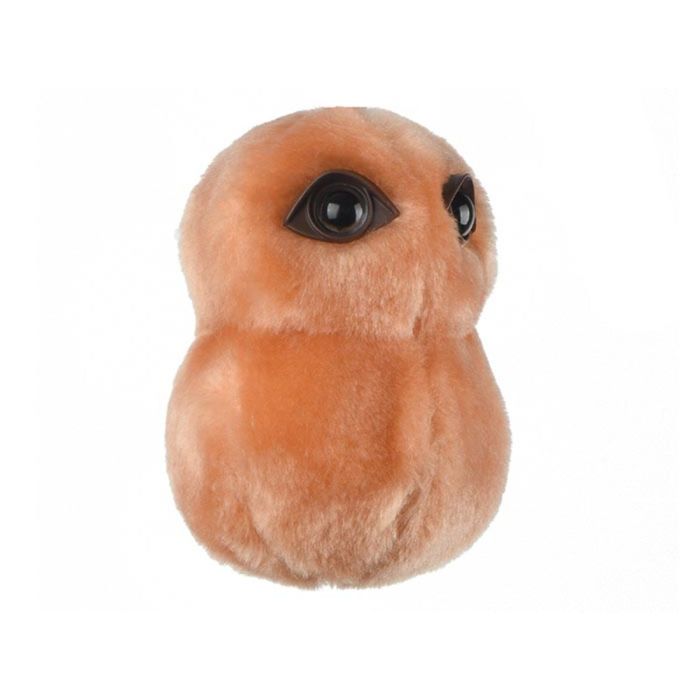Pneumonia (Streptococcus pneumonia)
Pneumonia is a lung infection in which the alveoli, air-exchanging sacs of the lungs, become inflamed and filled with fluid. It can come on suddenly and take your breath away.
This adorable plush representation of a bacteria that causes Pneumonia provides a fun hands-on-way to learn about heath, biology, microbes and how they can infect your lungs. A memorable and unique get well gift that will bring joy to friends and loved ones. Also, fun gift for students, scientists, educators, doctors, nurses, and anyone with a healthy sense of humor!
Features detailed stitching and includes an educational printed card with fascinating facts about the causes of this illness.
Your purchase supports United Nation’s Foundation’s Shot@Life campaign which has helped deliver millions of lifesaving vaccines around the world. 10% of the proceeds from your purchase will be donated to Shot@Life.
Product Details
Additional Information
| Sizes | Giantmicrobes are based on actual microbes, cells, organisms and other critters, only 1,000,000 times actual size! Gigantic (GG) 16-24" XL (XL) 10-15" Original (PD) 5-8" Keychain (KC) 2-4" with clip |
|---|---|
| Materials | Plush from all new materials. Stuffed with polyester fiber fill. Surface washable: sponge with water & soap, air dry. |
| Packaging | Each plush microbe includes a printed card with fun, educational and fascinating facts about the actual microbe or cell. |
| Safety | Every product meets or exceeds U.S. and European standards for safety. For ages 3 and up. |
All about Pneumonia (Streptococcus pneumonia)
FACTS: Pneumonia is a lung infection in which the small, air-exchanging sacs of the lungs (called alveoli) become inflamed and filled with fluid. It can come on suddenly and in serious cases it can take your breath away.
There are a number of causes of pneumonia, ranging from viruses to fungi to parasites to physical injury – though being caught in the rain without your coat is not among them. However, the most common cause of bacterial pneumonia infection is Streptococcus pneumoniae.
As the ringleader of a gang of more than 80 Pneumococcus bacteria, Streptococcus pneumoniae is such a common cause of pneumonia that a pneumonia vaccine has been developed to keep it (and 23 other of the worst kinds of Pneumococcus bacteria) at bay.
The vaccine is recommended for those most susceptible to pneumonia infection, such as the elderly and those with respiratory diseases, weakened immune systems, or chronic illnesses.
In addition, because pneumonia often occurs as a complication of influenza infection (or the flu), flu shots are also recommended for those at risk for pneumonia. However, unlike flu shots, one dose of the pneumonia vaccine provides long-term protection against the disease, though a follow-up dose is recommended in certain cases.
If you’re at risk for pneumonia, don’t hold your breath. Take precautions, and breathe a sigh of relief.
| Name | Streptococcus pneumonia |
|---|
| Actual Size | Individual bacteria are between 0.5 and 1.25 micrometers in diameter; E. coli are roughly five times larger than S. pneumonia bacteria. |
|---|
| Where It Lives | Infects the air sacs of the lungs. |
|---|
| System | S. pneumonia targets the respiratory system. |
|---|
| Commonality | As many as 400,000 hospitalizations from pneumococcal pneumonia are estimated to occur annually in the United States. |
|---|
| Symptoms | Symptoms include cough with phlegm or pus, fever, chills, and difficulty breathing. |
|---|
| Cure | Antibiotics can treat many forms of pneumonia. Some forms of pneumonia can be prevented by vaccines. |
|---|
| Deadliness/Severity | It is estimated that about 900,000 Americans get pneumococcal pneumonia each year and about 5-7% die from it. |
|---|
| Infectiousness |
Pneumococcal bacteria spread from person-to-person by direct contact with respiratory secretions, like saliva or mucus. Pneumonia is likely to strike after your immune system has been weakened, such as in a long hospital stay or after a long bout with the common cold. |
|---|
| History | Hippocrates and other ancients knew of pneumonia and reports of the surgical draining of fluids exist; however, bacteria were first seen in the airways of individuals who died from pneumonia by Edwin Klebs in 1875. |
|---|
| Fascinating Facts |
In 2013, 30% of cases of pneumonia were found to be invasive, meaning that the bacteria were resistant to one or more antibiotic drug. Many famous people, including Freddie Mercury and Rene Descartes, have died of pneumonia. In Culture: In Our Town, a 1938 Pulitzer Prize winning play by Thorton Wilder, pneumonia is the cause of death for Mrs. Gibbs. Pneumonia is the title of an album by the band Whiskeytown, released in 2001. |
|---|














